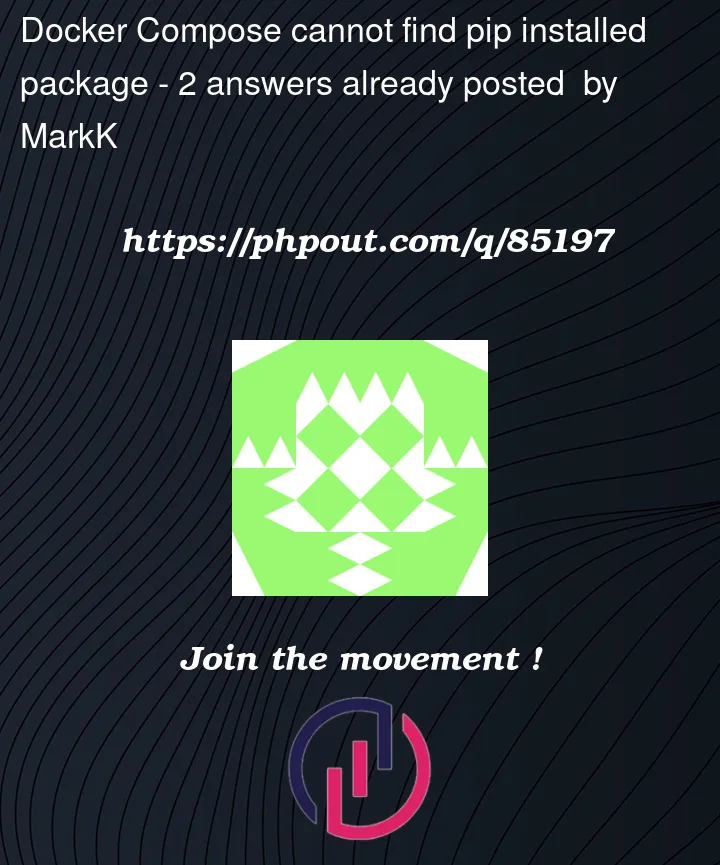Docker Compose gives ModuleNotFoundError: No module named 'django' error. Docker Compose has not installed my pip installed packages pip install -r requirements.txt but running the image any other way shows they are installed and this issue is only with docker-compose, why?
Compose
version: '3.8'
services:
web:
build: ./
user: python
volumes:
- ./:/app
ports:
- 8000:8000
env_file:
- ./.env.dev
Dockerfile
# Base image
FROM python:3.9.6
ENV HOME=/app
# create directory for the app user
RUN mkdir -p $HOME
# set work directory
WORKDIR $HOME
# install psycopg2 dependencies
RUN apt-get update
&& apt-get -y install libpq-dev gcc
&& pip install psycopg2
&& apt-get -y install gunicorn3
RUN pip install --upgrade pip
ADD requirements*.txt .
RUN pip install -r requirements.txt
COPY python . .
ENTRYPOINT ["/app/entrypoint.sh"]
EXPOSE 8000
Problem:
I have created the following Dockerfile which runs in production and even runs locally outside of docker-compose without any issues i.e the following works with no errors docker run -p 8000:8000 web/lastest.
However, when I run this via docker-compose it fails to find my installed pip packages.
For example:
- docker-compose build (successful)
- docker-compose up
Error
web_1 | ImportError: Couldn't import Django. Are you sure it's installed and available on your PYTHONPATH environment variable? Did you forget to activate a virtual environment?
web_1 | [2022-01-04 14:55:05 +0000] [1] [INFO] Starting gunicorn 20.1.0
web_1 | [2022-01-04 14:55:05 +0000] [1] [INFO] Listening at: http://0.0.0.0:8000 (1)
web_1 | [2022-01-04 14:55:05 +0000] [1] [INFO] Using worker: sync
web_1 | [2022-01-04 14:55:05 +0000] [8] [INFO] Booting worker with pid: 8
web_1 | [2022-01-04 14:55:05 +0000] [8] [ERROR] Exception in worker process
web_1 | Traceback (most recent call last):
web_1 | File "/usr/lib/python3/dist-packages/gunicorn/arbiter.py", line 589, in spawn_worker
web_1 | worker.init_process()
web_1 | File "/usr/lib/python3/dist-packages/gunicorn/workers/base.py", line 134, in init_process
web_1 | self.load_wsgi()
web_1 | File "/usr/lib/python3/dist-packages/gunicorn/workers/base.py", line 146, in load_wsgi
web_1 | self.wsgi = self.app.wsgi()
web_1 | File "/usr/lib/python3/dist-packages/gunicorn/app/base.py", line 67, in wsgi
web_1 | self.callable = self.load()
web_1 | File "/usr/lib/python3/dist-packages/gunicorn/app/wsgiapp.py", line 58, in load
web_1 | return self.load_wsgiapp()
web_1 | File "/usr/lib/python3/dist-packages/gunicorn/app/wsgiapp.py", line 48, in load_wsgiapp
web_1 | return util.import_app(self.app_uri)
web_1 | File "/usr/lib/python3/dist-packages/gunicorn/util.py", line 384, in import_app
web_1 | mod = importlib.import_module(module)
web_1 | File "/usr/lib/python3.9/importlib/__init__.py", line 127, in import_module
web_1 | return _bootstrap._gcd_import(name[level:], package, level)
web_1 | File "<frozen importlib._bootstrap>", line 1030, in _gcd_import
web_1 | File "<frozen importlib._bootstrap>", line 1007, in _find_and_load
web_1 | File "<frozen importlib._bootstrap>", line 986, in _find_and_load_unlocked
web_1 | File "<frozen importlib._bootstrap>", line 680, in _load_unlocked
web_1 | File "<frozen importlib._bootstrap_external>", line 790, in exec_module
web_1 | File "<frozen importlib._bootstrap>", line 228, in _call_with_frames_removed
web_1 | File "/app/app/wsgi.py", line 12, in <module>
web_1 | from django.core.wsgi import get_wsgi_application
web_1 | ModuleNotFoundError: No module named 'django'
Running which python outputs /usr/local/bin/python on both running the image directly and using docker-compose.
Running docker run -it 43d991d65c02 /bin/bash I can see and run Django. Only when running docker-compose is Django not installed, why?




2
Answers
In the containerfile presented, we work in the container-directory
/app. But at runtime, we mount a volume to/app. Hence, all content that is generated during image build time that is stored in/appis overridden by the volume mount. If the dependencies at runtime were installed in/app, then they are overridden by the volume mount.To fix this issue, two possibilities come to my mind:
We can remove the volume mount. This will, however, devoid us of the capability of "hot reloading".
We can re-run
pip install -r requirements.txtat container startup, before starting the application. This would mean adding the linepip install -r requirements.txtto theentrypoint.sh-script.When docker-compose mounts the volume to /app folder its previous structure become hidden and new structure overrides previous one.